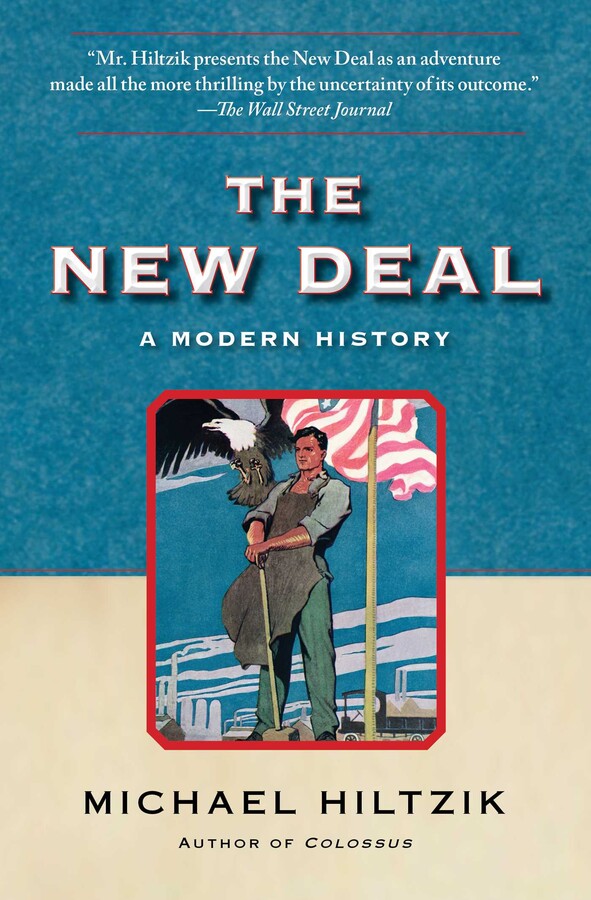Plus, receive recommendations and exclusive offers on all of your favorite books and authors from Simon & Schuster.
Table of Contents
About The Book
With The New Deal: A Modern History, Pulitzer Prize–winning writer Michael Hiltzik offers fresh insights into this inflection point in the American experience. Here is an intimate look at the alchemy that allowed FDR to mold his multifaceted and contentious inner circle into a formidable political team. The New Deal: A Modern History shows how Roosevelt, through the force of his personality, commanded the loyalty of the rock-ribbed fiscal conservative Lewis Douglas and the radical agrarian Rexford Tugwell alike; of Harold Ickes and Harry Hopkins, one a curmudgeonly miser, the other a spendthrift idealist; of Henry Morgenthau, gentleman farmer of upstate New York; and of Frances Perkins, a prim social activist with her roots in Brahmin New England. Yet the same character traits that made him so supple and self-confident a leader would sow the seeds of the New Deal’s end, with a shocking surge of Rooseveltian misjudgments.
Understanding the New Deal may be more important today than at any time in the last eight decades. Conceived in response to a devastating financial crisis very similar to America’s most recent downturn—born of excessive speculation, indifferent regulation of banks and investment houses, and disproportionate corporate influence over the White House and Congress—the New Deal remade the country’s economic and political environment in six years of intensive experimentation. FDR had no effective model for fighting the worst economic downturn in his generation’s experience; but the New Deal has provided a model for subsequent presidents who faced challenging economic conditions, right up to the present. Hiltzik tells the story of how the New Deal was made, demonstrating that its precepts did not spring fully conceived from the mind of FDR—before or after he took office. From first to last the New Deal was a work in progress, a patchwork of often contradictory ideas. Far from reflecting solely progressive principles, the New Deal also accommodated such conservative goals as a balanced budget and the suspension of antitrust enforcement. Some programs that became part of the New Deal were borrowed from the Republican administration of Herbert Hoover; indeed, some of its most successful elements were enacted over FDR’s opposition.
In this bold reevaluation of a decisive moment in American history, Michael Hiltzik dispels decades of accumulated myths and misconceptions about the New Deal to capture with clarity and immediacy its origins, its legacy, and its genius.
Product Details
- Publisher: Free Press (September 13, 2011)
- Length: 512 pages
- ISBN13: 9781439158951
Browse Related Books
Raves and Reviews
“Makes fascinating reading for a nation facing many of the same problems it confronted, and conquered, 80 years ago.” –Philadelphia Inquirer
“Mr. Hiltzik presents the New Deal as an adventure made all the more thrilling by the uncertainty of its outcome—‘a work in progress from its beginning to end’—and one that sustained democracy by keeping America from social and economic collapse.”—The Wall Street Journal
“Hiltzik gives a thrilling sense of the sweaty, seamy personal side of politics…the extent to which the various provisions of the New Deal were a non-ideological improvisation, hectic, driven, often fizzling and failing. Yet the big picture effects were swift and direct: 11.5 million people were unemployed in 1932; 6.2 million at the end of 1938. Pertinent, timely.” —Los Angeles Times
“A sweeping, lively survey… [written] with panache and skill…A timely, well-executed overview of the program that laid the foundation for the modern progressive state.”—Kirkus Reviews
“Terrific, energetically written and eminently readable….narrated with vigorous prose, a clear-sighted appreciation of just what motivated FDR and his allies, and a modern understanding of what they actually accomplished. And unlike the doorstop histories, you'll finish it quickly enough to be left wishing for more.” —Mother Jones
Resources and Downloads
High Resolution Images
- Book Cover Image (jpg): The New Deal eBook 9781439158951
- Author Photo (jpg): Michael Hiltzik Photograph by Amy Myers(0.1 MB)
Any use of an author photo must include its respective photo credit














